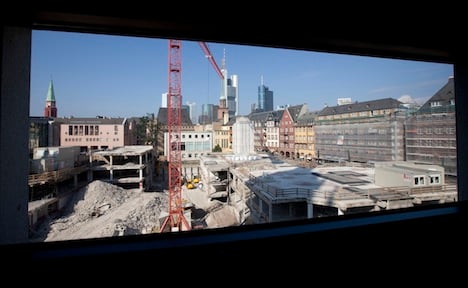A total of 35 new buildings are planned for the area between the cathedral and The Römer – Frankfurt’s town hall and one of its most important architectural landmarks. At least eight of these will be exact replicas of the historic buildings destroyed in the Second World War while 15 will be a mix of old and new.
So far €130 million in government funding has been invested in the project, which will is expected to reach completion in 2016. Many buildings have already been purchased even though the symbolic cornerstone was only laid last month.
But opinion on the project remains split between those wanting a wanting a complete reconstruction of the Frankfurt Altstadt, or old town, and others fearing it will be historic Disneyland.
Click here for a photo gallery of Frankfurt’s Altstadt
The city council hopes its compromise for at least some reconstructed structures will help return life to Frankfurt’s centre following the demolition two years ago of an ugly concrete office complex built on the site in the 1970s.
Initial plans for the prime property caused an uproar among those Frankfurters deeming it too modern. In an attempt to appease residents, the city council threw open their doors to the public in 2006 and invited them to offer their ideas on changes to the plans.
In 2007, amended blueprints were finalised much to the delight of the campaign group Altstadt-Forum Frankfurt (AFF), which had been pushing for a complete reconstruction of what they described as “one of the most beautiful old towns in Germany.”
The AFF is an initiative made up of Frankfurt-based societies, property and marketing experts and active community members who joined together with the aim of making the idea of rebuilding the old town reality.
And while the chairman Jürgen E. Aha originally told property magazine Immobilien Zeitung in 2010 that he was “pleased with the compromise,” the plans for the 27 buildings which are not going to be historical replicas have left the group less than impressed.
“The new buildings will look like dog kennels or provincial savings banks,” Aha recently lamented.
Whether an exact replica or somewhere in between, buildings in the “DomRömer” quarter, as it is being called, have to follow strict regulations. Sandstone is being used for the ground floor of every building and upper floors must be plastered or panelled with wood. Even window and roof dimensions must fit certain criteria.
The area itself will be arranged in a similar way to the original old town, with narrow alleyways running between buildings and a central square.
The architects, together with the council, hope it will bring a touch of history to the modern city centre, but Philipp Oswalt, director of design group Bauhaus foundation, has labelled the project “absurd and peculiar.”
“The designs for the replica buildings look like leftovers from a Christmas market,” he said.
DPA/The Local/jcw







 Please whitelist us to continue reading.
Please whitelist us to continue reading.
Member comments